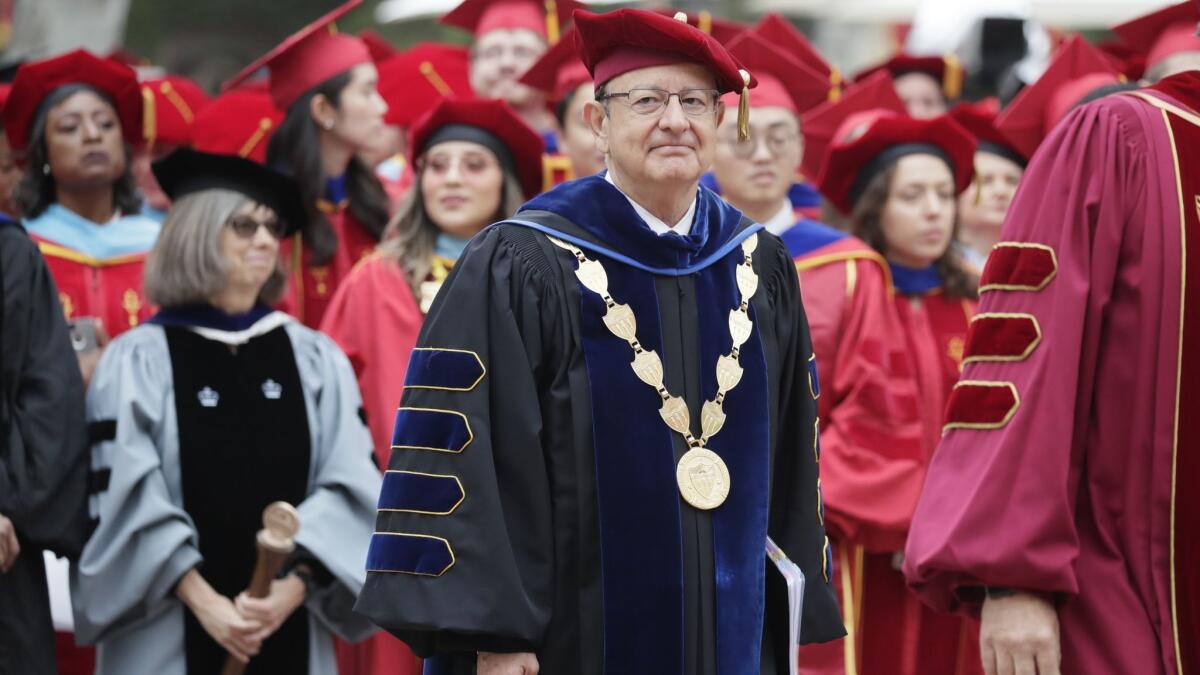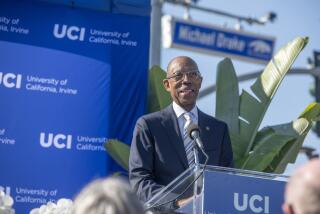200 USC professors demand Nikias step down; trustees express ‘full confidence’ in president

Two hundred USC professors on Tuesday demanded the resignation of university President C.L. Max Nikias, saying he had “lost the moral authority to lead” in the wake of revelations that a campus gynecologist was kept on staff for decades despite repeated complaints of misconduct.
In a letter to the USC Board of Trustees, the faculty members wrote that they had come together to “express our outrage and disappointment over the mounting evidence of President Nikias’ failure to protect our students, our staff, and our colleagues from repeated and pervasive sexual harassment and misconduct.”
“We call upon President Nikias to step aside, and upon the Board of Trustees to restore moral leadership to the university,” they wrote.
Read the USC faculty letter calling for Nikias’ resignation »
About an hour after the faculty members sent the letter, board Chairman John Mork released a statement saying that while trustees were “troubled by the distressing reports” about the campus doctor, he and others on its executive committee “strongly support” Nikias.
“The executive committee of the board has full confidence in President Nikias’ leadership, ethics, and values and is certain that he will successfully guide our community forward,” wrote Mork, a Colorado energy mogul who graduated from USC.
Nikias sent the campus community a 20-page “action plan” Tuesday that he said was prepared at the request of trustees. It called for a wide rethinking of university ethics that will include a rewrite of USC’s Code of Ethics and a new presidential commission on improving campus culture. In a statement, Nikias said he understood “the faculty’s anger and disappointment.”
“I am committed to working with them as we implement this wide-reaching plan and to rebuilding their trust,” he said.
There have been calls for Nikias’ ouster on social media and in an online petition circulated by alumni since the Los Angeles Times last week detailed USC’s handling of Dr. George Tyndall. But Tuesday’s letter marks a rare display of public criticism from some of the university’s most highly respected faculty members.
Those signing the letter represent 14 different schools within the university and include some of USC’s most prominent academics — former deans, department chairs and distinguished professors.
Ariela Gross, a nationally known expert in race and slavery who holds the title of John B. and Alice R. Sharp professor of law and history, helped draft the letter and described it in an interview as “a there’s-no-turning-back, regime-change letter.”
She and several law school colleagues began circulating it to tenured professors Sunday and had little trouble getting signatures, she said. USC has about 1,200 tenured faculty members.
“There’s a deep well of frustration across the university that the university has lost its way. It is harming our students and it is harming our reputation,” said Gross, who has taught at USC for 22 years.
The voting members of the Board of Trustees — 42 men and 17 women — are an elite group that includes billionaire tycoons, Hollywood power players and philanthropists. They have strongly backed Nikias, who has served as university president since 2010 and overseen a major expansion of the university as well as an aggressive fundraising effort.
Before Mork’s statement, none of the trustees had publicly commented on how Tyndall’s case was handled.
In letters to the public community, Nikias has apologized to women hurt by Tyndall, who was the only full-time gynecologist at the student health clinic from 1989 until 2016. Nikias said he, too, is struggling to understand how the doctor was allowed to continue treating patients.
Tyndall was the subject of numerous complaints from students and staff beginning in the 1990s, according to former patients and clinic staffers interviewed by The Times. He was removed from the clinic only after a frustrated nurse reported him to the campus’ rape crisis center in 2016.
In a letter Monday, USC Provost Michael Quick said that the university’s senior leadership had not learned about the complaints against Tyndall until 2017.
“It is true that our system failed, but … this claim of a coverup is patently false,” Quick wrote, acknowledging that many faculty and staff felt betrayed. “It is up to us to earn back that trust. For some of you that will take a lot; I am sure for some it is likely irreparable.”
An internal university investigation last year concluded that Tyndall’s pelvic exams were outside the scope of current medical practice and amounted to sexual harassment of students. Campus administrators told The Times that they believe the physician had for years been making sexual comments and touching patients inappropriately during exams.
Full coverage of the USC scandal »
The university struck a secret deal with Tyndall that allowed him to resign with a financial payout. USC did not report him to the state medical board at the time, a decision Nikias and other school leaders have called a mistake.
Tyndall, 71, has denied wrongdoing. In recent interviews with The Times, the physician defended his medical exams as thorough and appropriate, and said some of his comments to patients were misinterpreted.
High-profile plaintiffs lawyer Gloria Allred joined an attempt to hold USC legally responsible for Tyndall’s behavior Tuesday. She filed a lawsuit against the university on behalf of graduate student Daniella Mohazab, who said Tyndall made her feel “violated” during a 2016 exam.
Mohazab, the seventh woman this week to sue USC, said at a news conference that the gynecologist told her that Filipinas such as her were “good in bed” and pressed her for details of her sex life. She said that he examined her without a female nurse or other chaperone present and put his ungloved fingers inside her body.
“He felt around by moving his fingers around inside for a few minutes,” Mohazab said. “He said this was part of an STD test.”
The scandal is also drawing scrutiny in Sacramento. Prompted by the revelations about Tyndall, state Sen. Jerry Hill (D-San Mateo) announced Tuesday that he will hold a hearing next month into the reporting of sexual misconduct in the medical profession.
“The Medical Board cannot do its job as a regulator or fulfill its responsibilities for consumer protection if it is not alerted to these cases as they emerge,” Hill said in a statement.
In their letter, the faculty members said that USC’s “conduct is as much at issue in this case as the physician’s.”
In interviews, some professors said they regarded the Tyndall matter as only the latest in a string of scandals that undermined their faith in Nikias.
The Times reported last year that Carmen Puliafito, a prolific fundraiser whom Nikias helped select as dean of the medical school, used methamphetamine and other drugs while overseeing the school and treating patients. His successor, Rohit Varma, was forced out after the newspaper discovered that USC had settled a sexual harassment claim against him by a female researcher.
“We have this recurrence of faulty decisions,” said Dan Simon, Richard L. and Maria B. Crutcher professor of law and psychology. “It must be a function of the institutional culture — the institutional norms of reporting, of openness, of admitting error.”
K.C. Cole, a professor at the Annenberg School for Communication and Journalism, said: “There is a sense of corruption that plagues USC that is just unbearable.”
Nicholas Warner, a professor of physics, astronomy and mathematics, said he “thought long and hard” before deciding to sign the letter.
“One of the advantages of tenure is you can stand up and say things you believe to be true,” he said. “With that privilege comes a responsibility to say things that are true. We need to use it when it really matters.”
The head of the Academic Senate, professor Paul Rosenbloom, said he opted not to sign after considering the matter for an “enormous amount of time.”
“I understand the reason why people are calling for Max’s removal, but I don’t agree with their conclusion,” Rosenbloom said. “One need not have total faith in someone’s leadership in order to give someone a chance.”
Frank Zerunyan, a professor of practice and governance, said that although many of his friends had signed the letter, he disagreed with the approach. He called Nikias “a person of great integrity” and said removing him would do nothing to address the “bunch of problems” exposed by the Tyndall scandal.
“If it is a pothole that needs to be fixed, it needs to be fixed,” Zerunyan said. “Yelling at the public works director does not fix the pothole.”
Times staff writer Paul Pringle contributed to this report.
[email protected] | Twitter: @latimesharriet
[email protected] | Twitter: @sarahparvini
[email protected] | Twitter: @MattHjourno
UPDATES:
4:30 p.m.: This article was updated with comments from USC professor Frank Zerunyan.
2:25 p.m.: This article was updated with a statement from President C. L. Max Nikias and state Sen. Jerry Hill’s call for a legislative hearing into the reporting of sexual misconduct in the medical profession.
10:55 a.m.: This article was updated with comments from professor Paul Rosenbloom.
10:20 a.m.: This article was updated with a statement from the chairman of the USC Board of Trustees.
This article was originally published at 8:55 a.m.
More to Read
Sign up for Essential California
The most important California stories and recommendations in your inbox every morning.
You may occasionally receive promotional content from the Los Angeles Times.













